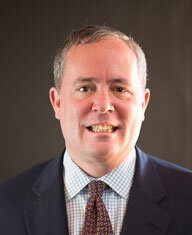
Patrick Brennan
Citation
Written by Fr. Michael Sweeney, OP, on May 2014 at the Induction in the College of Fellows
Patrick McKinley Brennan, the Dominican School of Philosophy and Theology salutes you.
In an address to members of the international theological commission in October, 2007, Pope Benedict XVI spoke of his concern for the way in which we conceive of civil law:
“Today's civil and secular society is found to be in a state of bewilderment and confusion: it has lost the original evidence of the roots of the human being and his ethical behavior. …Today, a positivist conception of law seems to dominate many thinkers. They claim that humanity or society or indeed the majority of citizens is becoming the ultimate source of civil law. The problem that arises is not, therefore, the search for good but the search for power, or rather, how to balance powers. At the root of this trend is ethical relativism, which some even see as one of the principal conditions for democracy, since relativism is supposed to guarantee tolerance of and reciprocal respect for people. But if this were so, the majority of a moment would become the ultimate source of law. …True rationality is not guaranteed by the consensus of a large number but solely by the transparency of human reason to creative Reason and by listening together to this Source of our rationalityt.”
In your work in the Academy you have listened closely to this Source of our rationality and, convinced that the Catholic tradition has decisive insights to offer contemporary legal and political theory, you have invited others to listen.
Having studied philosophy at Yale College and the University of Toronto you completed your Doctor in Jurisprudence from Boalt Hall, at the University of California, Berkeley. Having clerked for the Hon. John Noonan, Jr. on the U.S. Court of Appeals for the Ninth Circuit and worked for major law firms in Washington, D.C. and San Francisco, you taught for eight years at the Sandra Day O’Connor School of Law at Arizona State University where you also served as Associate Dean and Vice Dean. In 2004 you joined the faculty of Villanova University as the inaugural holder of the John F. Scarpa Chair in Catholic Legal Studies and where you have also served as the Associate Dean for Academic Affairs and Director of the Joint J.D./M.B.A. Program.
You have published three books and your more than 60 articles, book chapters and essays have appeared in the principal law reviews of the University of Pennsylvania, University of Michigan, Boston College, Emory University, University of Notre Dame, Villanova University, Fordham University, Pepperdine University, and the University of San Diego among others. You have been a visiting professor in the Boston College Law School and a senior research fellow at the Robbins Collection of Cannon and Civil Law at UC Berkeley. You have served a scholar in residence at the Columbus School of Law and at the Catholic University of America. You also serve on the committee for Lumen Christi’s initiatives in Catholic social thought.
You are presently completing work on three books. Your monograph, The Sovereignty of the Good: An Essay on Law Church and Authority will be published by Oxford University Press; the casebook, Christian Legal Thought: Cases and Materials, which you are co-writing with William Brewbaker III, will be published by Foundation Press and will be used as a textbook; Legal Affinities: Studies in the Legal Form of Thought, which you are co-editing with H. Jefferson Powell, will be published by Carolina Academic Press.
You have insisted that appeal to the Catholic tradition is essential for understanding the traditions of jurisprudence and governance in the West and have applied the tradition to a wide range of contemporary questions, including sovereignty, equality, authority, the rule of law, constitutionalism, the family, and punishment and forgiveness, as well as topics in administrative law, constitutional law, federal jurisdiction, religious liberty and the liberty of the Church, and criminal law. You suffer from no delusions with respect to the magnitude of your task: “Today, elected and appointed adherents of the creed of the modern nation state are dutifully poised to use the coercive force of the state itself, through its legislative, judicial, and administrative arms, to immobilize adherents of Christian religious law as they both strive to work such law into sociopolitical life through law and, in a rearguard action of widening scope, resist the gutting of current law, often a very long-standing, of its Christian legal content. The debate about what the law will recognize as marriage is only the most glaring example.”
We are grateful for your work and for your generous consent to join with us as a Fellow of this school.
Therefore, as an expression of our esteem and gratitude, and in virtue of the authority invested in me by the Board of Members of the Dominican School of Philosophy and Theology, I am privileged to bestow upon you, Patrick McKinley Brennan, the degree Doctor of Humane Letters honoris causa, and to name you a Fellow of the Dominican School of Philosophy and Theology.
